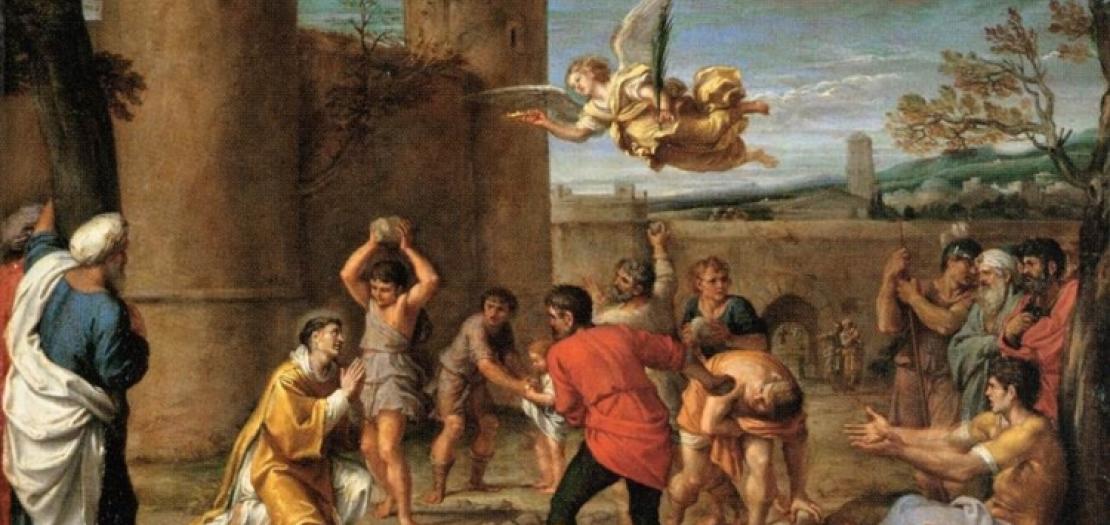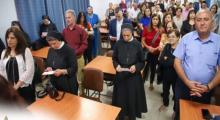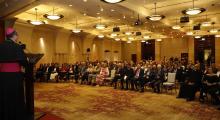Issued by the Catholic Center for Studies and Media - Jordan. Editor-in-chief Fr. Rif'at Bader - موقع أبونا abouna.org

Following is the text of the meditation by His Beatitude Cardinal Pierbattista Pizzaballa, Latin Patriarch of Jerusalem, on the 7th Sunday of ordinary time C, dated February 23, 2025:
If we wanted to summarize today’s passage from the Gospel (Lk 6:27-38) in a single sentence, we could say the following: Blessed are those who end their lives with an accounting in the red.
We are still, as we were last Sunday, in the sixth chapter of Luke’s Gospel, in which the evangelist reports the “plain speech” that begins with the section on the Beatitudes. Today’s passage immediately follows Jesus’ words about the “beatitudes” and “woes,” and is a direct continuation of them, like an extension that deepens the message.
The term that recurs most frequently is the one that has to do with love and appreciation: “Love your enemies,” (v. 27.35) “if you love those who love you.” (v. 32) And next to it a whole series of words that express a declension of love: bless, offer, do not reject, give, do good, lend, be merciful, do not judge, forgive. To love means all these things.
But of all these, in today’s passage Jesus emphasizes an attitude of heart that underlies the blessedness of love, namely gratuitousness.
You must love, yes, but also those who do not love you (“love your enemies, do good to those who hate you.” (Luke 6:27)
You must bless, yes, but also those who curse you (“bless those who curse you”). (Luke 6:28)
You must give, yes, but without expecting anything in return (“If anyone takes away your goods, do not ask for them again.”) (Luke 6:30) You also have to forgive those who have hurt you and will probably continue to do so.
And this applies to everything, to every area of life, to every area of our daily relationships.
So it’s not just about learning to love, but accepting that those who love are always on the losing end.
It is not possible to love in the hope of getting something out of it: That is an illusion. Loving means accepting that you have accounts that are in the red, accounts that do not open, accounts that are open.
In fact, we experience that this is very far from our lives.
We do everything we can to close accounts, to get even: justify, claim, pay, return... these are all attitudes we adopt in order to have neither debt nor credit, so that no one has open accounts with us. We also manage to love someone as long as they do not take anything away from our lives. Otherwise, we often stop there.
And maybe that’s exactly where we stop, where real life actually begins.
But why do we love in this way? What is the purpose of this love?
Jesus has only one answer.
Loving gratuitously is not something that is based on a lot of enlightenment, reasoning, thinking.
There is only one reason, and that is the reason of faith.
Hidden amidst all the other verses we find the real reason: The Father does the same. His accounts are also at loss: “But love your enemies, do good, and lend, expecting nothing in return. Your reward will be great, and you will be children of the Most High, for he is kind to the ungrateful and the wicked.” (Luke 6:35)
Then, we might say, when we have the accounts of loss, we can recognize the Lord who has lost everything with us and for us. We will be his children. All that we have lost out of love will be given back to us in the end as a great merit because we have come to know God, because we have experienced him; it will make us live His own life, which is a life that does not pass away.
Our real gain will be what we would have known to lose, it will be the free love we have known to give: the more we lose, the more we gain.
Life offers us countless opportunities to lose, to love, to break out of human logic, which stops at a balance that eventually becomes a logic of violence and death.
However, the path of love is always a creative, life-enhancing path.
For it is not a matter of passively suffering injustice, but of cherishing in our hearts the sure hope that good is stronger than evil, and that this is also the only way in which I can continue to hope, in our daily struggles, that the logic of giving is so beautiful and attractive that sooner or later it will be reciprocal, for the good of all.
+ Pierbattista
 The Catholic Center for Studies and Media in Jordan conveys well-wishes to elected Pope Leo XIV
The Catholic Center for Studies and Media in Jordan conveys well-wishes to elected Pope Leo XIV  Prince El Hassan opens conference on Arab Christians, calls for equality, enlightened citizenship
Prince El Hassan opens conference on Arab Christians, calls for equality, enlightened citizenship 




